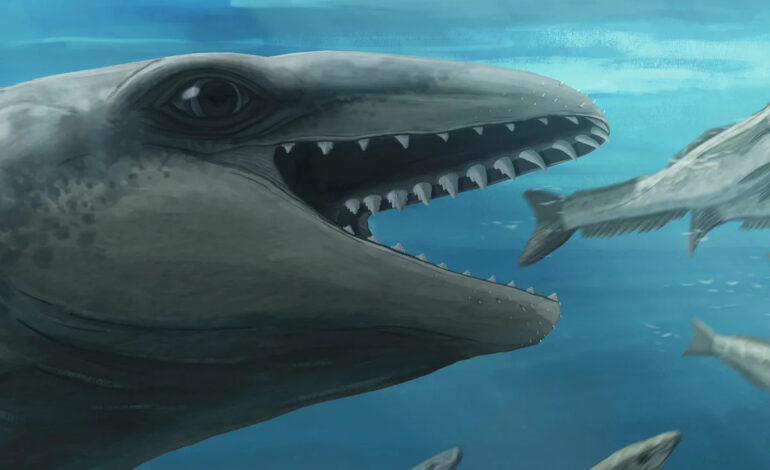Rare Fossil Discovery Unlocks Secrets of Prehistoric Whale Evolution

A recent discovery of a fossil on an Australian beach has led paleontologists to identify a new species of prehistoric whale, shedding light on the evolution of these majestic creatures. The fossil, estimated to be around 25 million years old, was found at Jan Juc Beach in Victoria, Australia, a site known for its rich paleontological history.
Researchers officially named the species Janjucetus dullardi in the Zoological Journal of the Linnean Society. This unique creature, which boasted bulging eyes the size of tennis balls and a face described as “deceptively cute,” was significantly different from modern whales. Unlike their contemporary counterparts, this juvenile specimen was small enough to fit in a single bed and was equipped with sharp teeth and a shark-like snout, indicating it was a fierce predator.
Erich Fitzgerald, senior curator of vertebrate paleontology at Museums Victoria Research Institute and one of the authors of the study, explained, “It might have looked for all the world like some weird kind of mash-up between a whale, a seal and a Pokémon but they were very much their own thing.”
Understanding Whale Evolution Through Fossil Discoveries
The partial skull of Janjucetus dullardi was unearthed in 2019 and marks only the fourth species identified from a group known as mammalodontids, which lived during the Oligocene Epoch, approximately 34 to 23 million years ago. This period represents a significant chapter in whale evolution. The small predators, likely reaching lengths of up to 3 meters (10 feet), represent an early branch that would eventually lead to today’s baleen whales, such as humpbacks and blues.
Despite the rarity of these findings, Fitzgerald remarked on the importance of uncovering fossils like Janjucetus dullardi, stating, “Cetaceans represent a fairly miniscule population of all life.” The conditions required for fossil preservation are stringent; factors such as erosion, scavengers, and ocean currents complicate the fossilization process.
The discovery of Janjucetus dullardi adds to our understanding of how ancient whales adapted to their environments and evolved over millions of years. Researchers believe these findings can provide insights into the behavior, movement, and feeding habits of prehistoric cetaceans, as well as how they responded to changing climates.
A Fossil Hunter’s Journey to Discovery
The fossil was named in honor of Ross Dullard, the amateur fossil hunter who discovered it. Dullard described the moment he found the skull while fossil hunting at Jan Juc Beach: “I thought, geez, we’ve got something special here.” His keen eye for fossils and persistence in the field paid off, as he recognized the significance of the find and submitted photos to Museums Victoria. Fitzgerald quickly identified the potential for a new species based on the images.
“It’s literally been the greatest 24 hours of my life,” Dullard expressed after the confirmation of the species. He celebrated the momentous occasion with enthusiasm, noting the support from friends and family who had endured his passion for six years leading up to this discovery.
In celebration of the confirmation of Janjucetus dullardi, Dullard plans to host a fossil-themed party featuring games and whale-shaped treats. “That’s taken my concentration for six years. I’ve had sleepless nights. I’ve dreamt about this whale,” he said, reflecting on his dedication to paleontology.
The discovery of Janjucetus dullardi is not only a testament to the wonders of paleontology but also a reminder of the rich history of life on Earth. Such rare findings continue to unlock the mysteries of evolution and provide a deeper understanding of the natural world.






